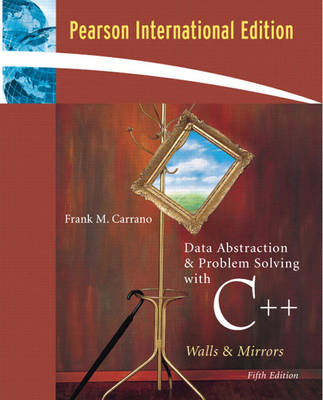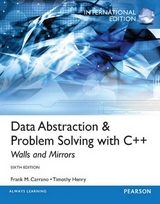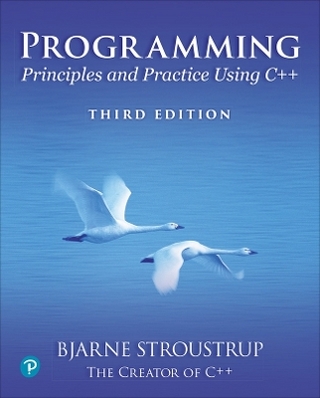
Data Abstraction & Problem Solving with C++
Pearson (Verlag)
978-0-321-48500-7 (ISBN)
- Titel erscheint in neuer Auflage
- Artikel merken
Frank’s Making it Real blog http://frank-m-carrano.com/blog/ extends his textbooks and lectures to a lively discussion with instructors and students about teaching and learning computer science.
Follow Frank on Twitter: http://twitter.com/Frank_M_Carrano
Find him on Facebook: https://www.facebook.com/makingitreal
Frank M. Carrano is a professor emeritus of computer science at the University of Rhode Island. He received the Ph.D. degree in computer science from Syracuse University in 1969. His interests include data structures, computer science education, social issues in computing, and numerical computation. Professor Carrano is particularly interested in the design and delivery of undergraduate courses in computer science. He has authored several well-known computer science textbooks for undergraduates. Frank’s Making it Real blog http://frank-m-carrano.com/blog/ extends his textbooks and lectures to a lively discussion with instructors and students about teaching and learning computer science. Follow Frank on Twitter: http://twitter.com/Frank_M_Carrano Find him on Facebook: https://www.facebook.com/makingitreal
Preface
Chapter Dependency Chart
PART ONE - Problem-Solving Techniques
1 Principles of Programmingand Software Engineering
1.1Software Engineering and Object-Oriented Design
1.2 Achieving a Better Solution
1.3 Key Issues in Programming
2 Recursion: The Mirrors
2.1 Recursive Solutions
2.2 Counting Things
2.3 Searching an Array
2.4 Organizing Data
2.5 Recursion and Efficiency
3 Data Abstraction: The Walls
3.1 Abstract Data Types
3.2 Specifying ADTs
3.3 Implementing ADTs
4 Linked Lists
4.1 Preliminaries
4.2 Programming with Linked Lists
4.3 Variations of the Linked List
4.4 Application: Maintaining an Inventory
4.5 The C++ Standard Template Library
5 Recursion as a Problem-Solving Technique
5.1 Backtracking
5.2 Defining Languages
5.3 The Relationship Between Recursionand Mathematical Induction
PART TWO Problem Solving with Abstract Data Types
6 Stacks
6.1 The Abstract Data Type Stack
6.2 Simple Applications of the ADT Stack
6.3 Implementations of the ADT Stack
6.4 Application: Algebraic Expressions
6.5 Application: A Search Problem
6.6 The Relationship Between Stacks and Recursion
7 Queues
7.1 The Abstract Data Type Queue
7.2 Simple Applications of the ADT Queue
7.3 Implementations of the ADT Queue
7.4 A Summary of Position-Oriented ADTs
7.5 Application: Simulation
8 Advanced C++ Topics
8.1 Inheritance Revisited
8.2 Virtual Methods and Late Binding
8.3 Friends
8.4 The ADTs List and Sorted List Revisited
8.5 Class Templates
8.6 Overloaded Operators
8.7 Iterators
9 Algorithm Efficiency and Sorting
9.1 Measuring the Efficiency of Algorithms
9.2 Sorting Algorithms and Their Efficiency
10 Trees
10.1 Terminology
10.2 The ADT Binary Tree
10.3 The ADT Binary Search Tree
10.4 General Trees
11 Tables and Priority Queues
11.1 The ADT Table
11.2 The ADT Priority Queue: A Variation of the ADT Table
11.3 Tables and Priority Queues in the STL
12 Advanced Implementations of Tables
12.1 Balanced Search Trees
12.2 Hashing
12.3 Data with Multiple Organizations
13 Graphs
13.1 Terminology
13.2 Graphs as ADTs
13.3 Graph Traversals
13.4 Applications of Graphs
14 Processing Data in External Storage
14.1 A Look at External Storage
14.2 Sorting Data in an External File
14.3 External Tables
A Review of C++ Fundamentals
B ASCII Character Codes
C C++ Header Files and Standard Functions
D Mathematical Induction
E Standard Template Library
F C++ Documentation Systems
| Erscheint lt. Verlag | 25.8.2006 |
|---|---|
| Sprache | englisch |
| Maße | 186 x 232 mm |
| Gewicht | 1340 g |
| Themenwelt | Mathematik / Informatik ► Informatik ► Programmiersprachen / -werkzeuge |
| Informatik ► Software Entwicklung ► Objektorientierung | |
| Informatik ► Theorie / Studium ► Algorithmen | |
| ISBN-10 | 0-321-48500-9 / 0321485009 |
| ISBN-13 | 978-0-321-48500-7 / 9780321485007 |
| Zustand | Neuware |
| Informationen gemäß Produktsicherheitsverordnung (GPSR) | |
| Haben Sie eine Frage zum Produkt? |
aus dem Bereich



